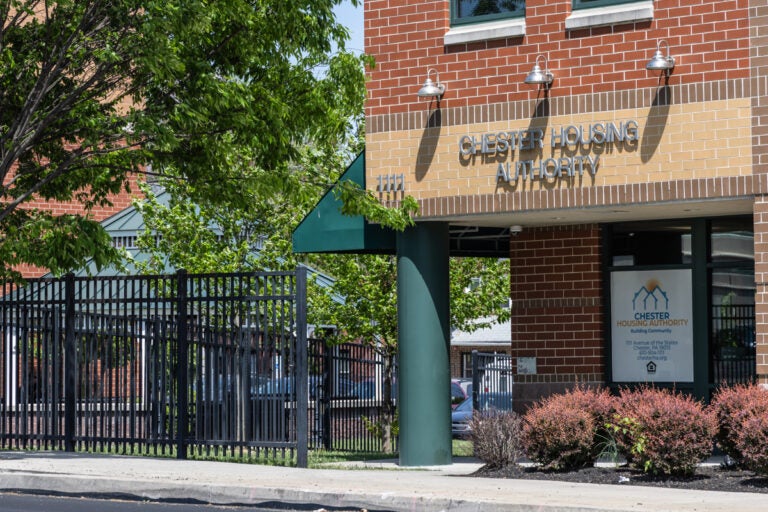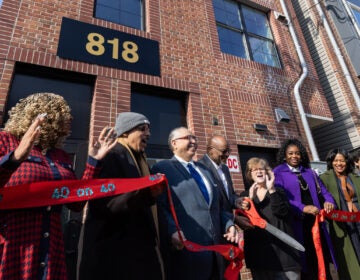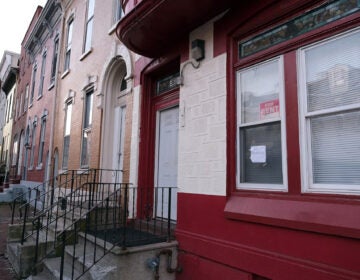HUD places Chester Housing Authority on ‘troubled’ list
The Chester Housing Authority’s designation is due to “poor physical conditions.” Meanwhile, a federal probe into bribery and fraud recently delivered a trio of guilty pleas.
Listen 1:10
The Chester Housing Authority of Chester, Pa. (Kimberly Paynter/WHYY)
From Delco to Chesco and Montco to Bucks, what about life in Philly’s suburbs do you want WHYY News to cover? Let us know!
The U.S. Department of Housing and Urban Development designated the Chester Housing Authority (CHA) as “troubled.”
HUD handed CHA a paltry Public Housing Assessment (PHA) score of 53% in April 2023. An overall score below 60% earns a spot on the troubled list. HUD regulations require that housing authorities must improve within two years. CHA has until 2025.
The PHA measures each housing authority’s performance in four categories: capital fund, financial, management and physical condition.
“The score is primarily due to poor physical conditions,” the spokesperson said.
If the local housing authority fails to remove itself from the troubled list, it’s unclear how 2,500 Chester families living in CHA-managed properties or receiving housing vouchers would be affected.
“HUD will assess and take appropriate next steps based on rules and regulations,” a HUD spokesperson said.
The federal agency could seize control of the authority, appoint a receiver to manage it or seek proposals for an outside party to take over.
HUD negotiated a recovery agreement and plan with CHA on Jan. 9. In an emailed statement to WHYY News, CHA executive director Steven Fischer said progress is already underway.
“Building maintenance has improved greatly,” Fischer said. “Work orders are being processed at, by far, the highest rates in many years. Vacancy reduction is on a fast track with a staffing surge and the use of local contractors. We have also worked hard at securing additional funding to both reduce vacancies and refurbish an aging housing stock.”
Fischer declined a phone interview.
CHA’s recent struggles with pandemic woes, active federal probe
The Chester Housing Authority was first established in 1937, and most of its housing units were built in the 1940s. Today, it operates 800 units across 15 locations and properties, which are a combination of family developments, senior buildings, rowhouses and twin homes.
Fisher said the coronavirus pandemic was a primary component in destabilizing the authority.
“The maintenance of buildings and grounds fell under ‘essential work only’ parameters causing inspection scores to suffer,” Fischer said. “An eviction moratorium, which had to be respected, caused lax habits to be adopted by some residents. The latter two were anticipated and a labor surge was planned once health officials announced it was safe to resume normal operations.”
This wouldn’t be HUD’s first scrutiny of the CHA. In 1989, residents filed a class action lawsuit against the housing authority citing poor building conditions, which prompted an unsuccessful attempt from HUD to save it. Eventually, a federal judge in 1994 appointed a receiver to rescue the authorities’ finances. CHA found stability eventually. The judge hired Fischer in 2005 to re-establish control.
While Fischer mostly blamed the pandemic for CHA’s recent woes, he said the authority was “victimized” from within.
“In the shadows of curtailed staff interaction due to the pandemic, two previously trusted employees with supervisory status elected to exploit the agency for personal gain,” Fischer said.
The U.S. Attorney’s Office in the Eastern District of Pennsylvania hit two CHA supervising employees and an outside contractor with bribery and fraud charges. Federal prosecutors alleged the contractor bribed the employees in exchange for work and that the employees created a contracting company to fraudulently bill the CHA. The fraudulent billing cost the housing authority nearly $500,000 in revenue losses.
All three defendants pleaded guilty. A spokesperson with the U.S. Attorney’s Office said they are scheduled to be sentenced later this month. The spokesperson could neither confirm nor deny the existence of additional investigations into the CHA.
Roots vows to provide proper oversight of CHA operations
First-term Mayor Stefan Roots didn’t find out about CHA’s “troubled” designation until he met with HUD a couple of months back. Roots said it was “disappointing” to hear the news from the federal government.
“Admittedly, the Chester Housing Authority is obviously a product of the city of Chester government,” Roots said.
Roots, who inherited a bankrupt municipality, said he’s made it a priority to understand the different authorities operating outside of City Hall’s purview.
“We’ve learned very early this year that the numbers that we have inside city hall regarding the number of units that the Chester Housing Authority have don’t match the Chester Housing Authority records,” Roots said. “So, that’s just a couple of the items that just aren’t squaring with us here in City Hall.”
Chester is home to the majority of public housing units in Delaware County, Roots said. He said it’s troubling to see a particular CHA development that is 60% “boarded up.”
“When you consider that there’s a waiting list for public housing, I can only scratch my head as to imagine why these places have been boarded up for so long,” Roots said. “These are the issues that we have brought HUD in to help us kind of understand from their perspective.”
Because the CHA uses private building managers for a few of its properties, Roots said there is a lack of consistency in addressing resident complaints and delivering services. He is calling for city oversight because he constantly receives calls from frustrated residents.
“The reason that people should care is because they’ll finally know that the city of Chester cares. I have to question what type of oversight on this authority has been established over the years for so much of this — the trouble in the ‘troubled’ status — to have you know going on for so long,” Roots said.
Roots and City Council have the authority to appoint members to the five-person CHA board.

Get daily updates from WHYY News!
WHYY is your source for fact-based, in-depth journalism and information. As a nonprofit organization, we rely on financial support from readers like you. Please give today.







